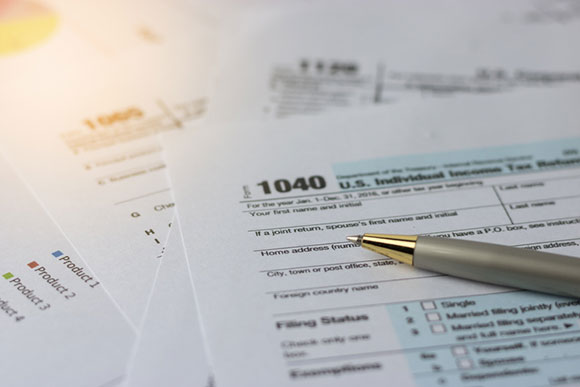Taxes can be tedious and confusing. Filing taxes after a divorce is even more complicated. Our Las Vegas divorce attorneys have created this guide to help you understand tax filings after divorce.

When you get divorced, your tax filing status is going to change. The date in question is December 31st of each year. If your divorce isn’t final by December 31st, you may still file jointly or married filing separately for that year. But if your divorce is final on or before December 31st, you may no longer use a joint filing status. In that case, you switch to head of household status or single status going forward.
You qualify to file taxes as head of household after your divorce if you meet the following criteria:
If you qualify to file as head of household, it can give you a larger standard deduction than filing as a single ($18,650 in 2020, $18,800 in 2021). It’s usually a good idea to file as head of household if you qualify, as it can create significant tax savings.
You do not have to file taxes together if you are divorced. In fact, if your divorce is final by December 31st of a given year, you can’t file taxes together. When your divorce is pending as of the last day of the year, you may file jointly or married filing separately. However, if you’re divorced, and the divorce is final, you may no longer file taxes together. Instead, you must file as a single or head of household depending on your circumstances.
Many divorces result in an award of alimony. For divorces that are finalized after January 1st, 2019, alimony does not play a role in taxes after divorce. The spouse that pays it does not deduct it. The spouse that receives alimony does not claim it as income on taxes. Spouses need to factor this in when they determine the appropriate award of support.
In 2021, the person who pays the alimony counts it as their income. The person who receives the alimony does not include it in their income. In 2021, alimony is not factored into taxes. Instead, the person who makes the payment still counts the amount that they pay in their own income, and the person who receives it does not have to report it.
Child support does not play any role in taxes after divorce. For the parent who pays child support, it is just like any other bill that is not deductible from taxes. A parent receiving support does not pay taxes on it. State laws determine how taxes factor into the calculation of a child support amount.

No, child support is not taxable. The person who receives child support does not have to pay taxes on the amount that they receive. However, the person who pays the child support must still pay taxes on their income regardless of how much they pay in support. Child support may not be deducted from or added to income.
Read More: Is Child Support Taxed in Nevada?
Whether child support is calculated before or after taxes depends on state law. Some states use gross income while other states use net income to calculate child support. Nevada uses gross income to calculate child support, for example (Nev. Rev. Stat. Ann. § 125B.070 (1)(a)1). The percentages used to calculate support also vary by state, so states that use gross income may use a lower overall percentage to arrive at roughly the same amount of support.
When divorcing parties share minor children, it raises the question of who claims the children on taxes. How parents claim dependents on taxes after divorce depends on the court order, as well as who has primary custody of the children.
Divorced parents claim dependents as follows:
Be sure to evaluate your W-4 withholdings after a divorce. Your number of exemptions may have changed. Filing an update ensures that you receive the correct withholding rates.
Finally, divorced spouses must determine who pays taxes on assets following a divorce. The spouse that is awarded an asset must pay any taxes due on it in the future. For example, if a spouse receives the marital home, they must pay the property taxes for it in the future. If a parent gets an asset that generates interest income, they must pay the taxes on the income.
If one spouse is court-ordered to satisfy certain debts, including outstanding tax debts, they must comply with the order. When a spouse fails to comply with the court order to make certain payments, the other spouse may move the court to have them held in contempt of court. A Nevada family law attorney can help you determine if filing a motion for contempt of court is a viable option in your case.
Do you have questions about how to manage your affairs before, during or after a divorce? Our lawyers help their clients understand their rights and plan for the future. Contact us today to talk about your case.